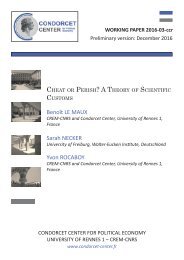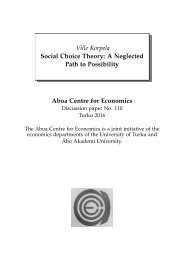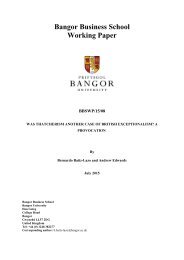MEMORANDUM
n?u=RePEc:hhs:osloec:2016_018&r=hpe
n?u=RePEc:hhs:osloec:2016_018&r=hpe
You also want an ePaper? Increase the reach of your titles
YUMPU automatically turns print PDFs into web optimized ePapers that Google loves.
letter was returned after two days with a handwritten annotation by the Dean that the<br />
request had been denied, followed by an official letter of 12 November 1927 in which Dean<br />
Bieberbach regretted that Leontief’s request to be allowed to take doctoral exam had been<br />
denied as Leontief had only studied five semesters, instead of the required minimum of six.<br />
Professor Karl Stählin who had been fully informed by Leontief (or perhaps more<br />
likely by Leontief Sr.) that the request had been rejected, wrote to the Dean on 14<br />
November, recommending Leontief warmly, arguing that he ought to be granted one<br />
semester for the seven or eight he had studied in Petrograd. Stählin also used the offer<br />
from Harms for what it was worth and referred to his close friendship with Leontief’s<br />
parents. He appealed to the Dean: “If anything can be done in his favor in this matter, I<br />
should be extraordinary happy for this highly gifted and industrious young man.”<br />
Also Professor Kurt Breysig wrote in support of Leontief’s request one week later and<br />
begged to the Dean to find a way help Leontief as Breysig’s judgment – as that of Sombart<br />
– was that Leontief was an extraordinarily capable person. Also Breysig mentioned the<br />
Russian exam and the offer from Harms as reasons for granting the request. Breysig even<br />
added that with the delay imposed on Leontief by denying the request put at risk not only<br />
the post in Kiel but in part also his future. Dean Bieberbach reacted to these appeals and,<br />
indeed quickly, by forwarding Leontief’s request to the Ministry on 3 December and ask<br />
for it to be granted.<br />
As the deadline for registration for the doctoral exam expired on 10 December<br />
Leontief could not afford to wait for the Ministry decision as that might take a month or so.<br />
He decided to submit his formal request to be allowed admission to the Doktorprüfung by<br />
the deadline. In the letter of 9 December he asked to be examined in economics as major<br />
and in history and philosophy as minors, enclosing the dissertation Wirtschaft als Kreislauf,<br />
and a brief cv (Lebenslauf).<br />
Leontief’s dissertation which was published in a well-known German economic<br />
journal. In our view the dissertation was of little importance in determining the specific<br />
route along which Leontief arrived at the input-output formulation, without denying its<br />
significance in the formation of Leontief’s overall conception of economic science.<br />
Insightful comments on the dissertation can be found e.g. in Lager (2009) and Kurtz and<br />
Salvadori (1995, 2006).<br />
The Ministry responded to the Dean on 14 December that it was not inclined to<br />
approve Leontief’s request, pointing out that Leningrad studies could not be considered<br />
equivalent to German university studies and hence could not be counted. Hence, in order<br />
to avoid establishing a precedent the Ministry requested from the Faculty as soon as<br />
possible its opinion as to whether the accomplishments of the applicant (i.e. Leontief) were<br />
so superior that his admission to the doctoral exam would not permit doubts. The Ministry<br />
also asked for the evaluation reports of Leontief’s dissertation. Dean Bieberbach<br />
33





